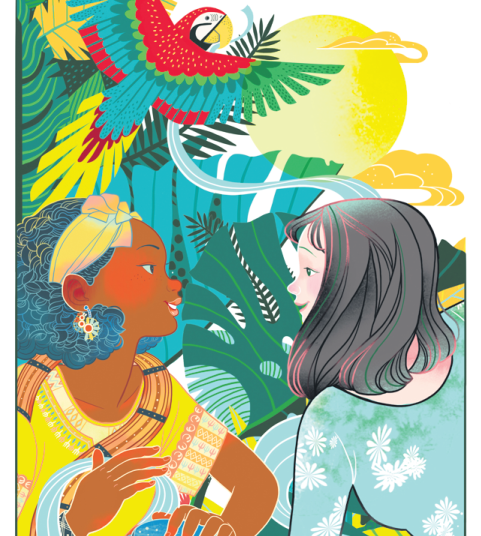What is culture and why is there a need for cultural exchange? I have been pondering this question ever since I decided, five years ago, to quit my job in advertising and media to devote my time to building cultural bridges between China and Africa.
Dictionaries offer several definitions of culture. The one that resonates the most with my mission is: “the customs, arts, social, institutions, and achievements of a particular nation, people, or other social group.”
Cultural exchanges are important. Only by understanding each other’s cultures and traditions can two countries (rather their peoples) build long-lasting political and economic ties. But this is easier said than done. Take the China-Africa relationship for example. On the one hand, we have Chinese culture, one of the world’s oldest with a history spanning more than 5,000 years. On the other hand, we have the diverse cultures of the more than 2,000 ethnic groups that make up the African continent. Where do you start?
Establishing effective cultural exchanges between China and Africa is as daunting as it sounds.
Yet a constructive place to start would be to take a look at the historical exchanges between China and Africa. While little is known of medieval contacts between China and Africa, the visits of Moroccan scholar Ibn Battuta and Somalian scholar Sa’id to China in the 14th century are well documented as are the voyages of Chinese explorer Zheng He to Africa in the 15th century. The political and economic relations that define the China-Africa relationship as we know it today began during the leadership of Chairman Mao Zedong.
While exchanges between China and Africa have been primarily defined by trade and politics, over the last few decades, we have seen a marked uptick in cultural exchanges, mostly facilitated by the Chinese government. But recent events such as the supposed evictions of Africans from Guangzhou, Guangdong province, and the vitriolic internet comments about China’s relaxed “green card” rules resulting in an influx of “unwanted Africans” show there is more work to be done to promote better cultural understanding at the grassroots.
True, governments on both sides have a role to play, as have Confucius Institutes across Africa and African cultural events around China, but I believe it is the involvement of private enterprises that will take things to the next level.
Private companies driven by commercial interests can help bridge cultural divides by introducing modern interpretations of culture to conversations and debates. Beyond traditional culture such as language and performing arts, we see art, design, fashion, films, food and beverages, furniture, literature, music, technology being added to the mix. This is a good thing, because it is in the modern personification of the two cultures that the young generations will find new common ground. And it is on this common ground that the foundation of a long-lasting relationship will be laid.
So how do we encourage more businesses to take up the challenge of building these new cultural bridges?
Like the cultures of China and Africa, the new business approaches to building cultural understanding are myriad and diverse. One approach is for governments and institutions on both sides to encourage and support private businesses that are helping move China-Africa cultural exchanges into a new era.
A few such businesses and individuals promoting African culture in China today include Feizhou Mama, or African Mother, based in Hangzhou, Zhejiang province, which runs African art and culture exhibition spaces; Beijing-based Kente& Silk, a team of talented African and Chinese youths offering services for branding, strategic advisory and cultural events; and Liu Haifang, director of the Center for African Studies at Peking University, who is very active in the African student community and writes on China-Africa matters, mainly cultural. And my brand, African Art Space, has engaged with thousands of young people through African art-themed cafes, cocktail bars and events in Guangzhou and Zhuhai in Guangdong, and Sanya in Hainan province to promote China-Africa cultural exchanges.
In 1990, in an economic history class at the London School of Economics and Political Science, I was inspired by the profound changes brought about by Deng Xiaoping’s reform and opening-up policy. The idea of 5,000 years of Chinese culture was intoxicating, and I was excited about the possibilities of transformation of not just the Chinese people but also those in the rest of the world, especially in Africa. I believe many smart and talented people in China are equally curious about the African continent and, given the right incentives, will launch businesses in Africa and promote Chinese culture in a commercial way that resonates with the younger generations. And I hope others, with the support of governments and institutions, will also take up the challenge.
The foundation for Sino-African “brotherhood” was laid in the 1960s, and that bond has only gotten stronger. It is now up to us to leverage meaningful cultural exchanges to take the relationship to loftier heights. I am optimistic that the valuable and mutually beneficial friendship will only deepen through increased dialogues, enhancement of traditional cultural exchanges, and more business activity across the China-Africa cultural landscape.
The author is the founder of African Art Space (China) and a volunteer of 51give, a Beijing-based charity.












